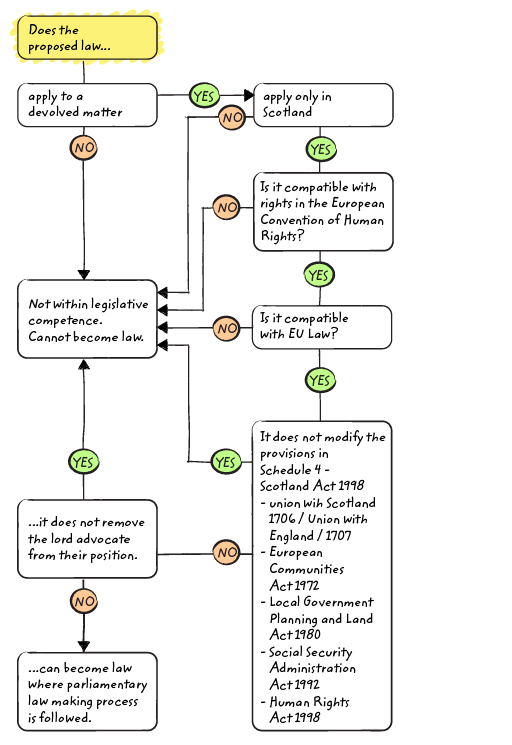2.1 The criteria to determine legislative competence
Legislative competence of the Scottish Parliament is defined according to five criteria:
- The UK Parliament can only legislate for or in relation to Scotland.
- The Scottish Parliament cannot legislate in relation to the ‘reserved matters’.
- The UK Parliament cannot modify certain enactments (these include the Human Rights Act 1998, certain provisions of the Acts of Union 1705-6 and the European Communities Act 1972).
- Any legislation must be compatible with the European Convention on Human Rights (ECHR) and with European Union law.
- The Scottish Parliament cannot remove the Lord Advocate from their position as head of the system for criminal prosecution.
The concept of legislative competence is important because the Scotland Act 1998 (as amended) requires the legislative competence of any Bill to be assessed before it is introduced, and also provides an opportunity for it to be challenged after a Bill is passed but before it can become law.
The Scottish Parliament does not have power to legislate for England, Wales or Northern Ireland; it cannot legislate on reserved matters and cannot create legislation which is incompatible with EU law or the ECHR. It must follow the provisions of the Scotland Act 1998 (as amended).
Box 1 Changing legal culture
Legislative competence is a way of determining whether an Act of the Scottish Parliament has been produced within the power of the Scottish Parliament.
This represents a change in the legal culture of Scotland. Practising and academic lawyers had, until this point, been taught that an Act of Parliament was law. With the introduction of the Scottish Parliament they must now question whether an Act of Parliament is law. If an Act of the Scottish Parliament has been passed in an area where there is no legislative competence, that Act can be challenged. Where such issues arise they will be determined by a court. The final court for the determination of these issues is the Supreme Court of the United Kingdom.
You may recall from your studies of the rule of law that one of the underlying principles was that laws should be freely available. The use of the internet has enabled greater access to legislation. Laws made by both the Scottish and UK Parliaments can be accessed quickly online. They are also available in hard copy. However, you also explored that the rule of law requires that the law is written in language that is, so far as possible, clear and free from ambiguity. Having considered Sections 28 and 29 Scotland Act 1998 (as amended) you may have developed a view as to whether laws of the UK Parliament (the Scotland Act 1998 was passed by the UK Parliament as it transferred its powers to a new Scottish Parliament) are written in a clear and unambiguous way.

